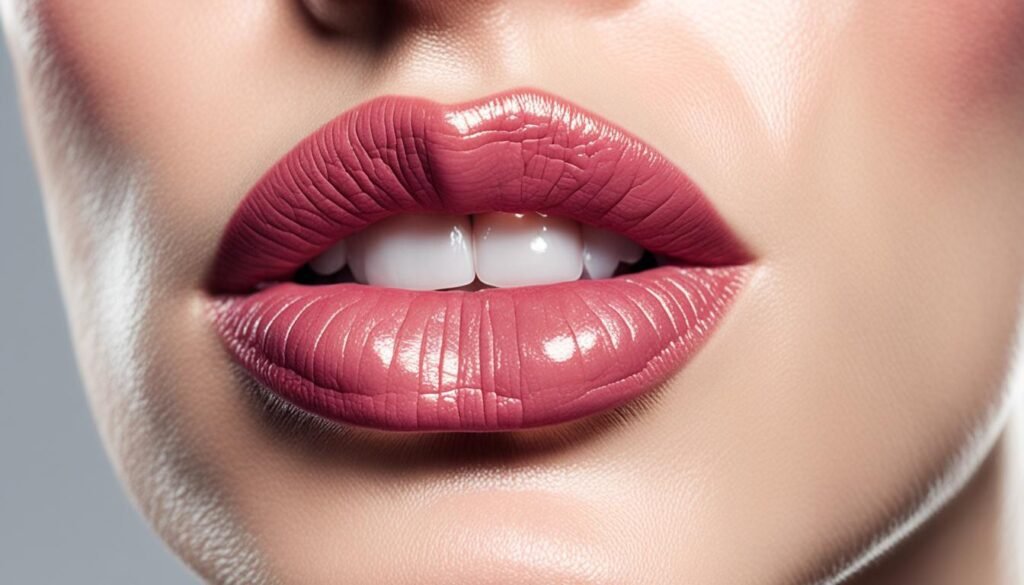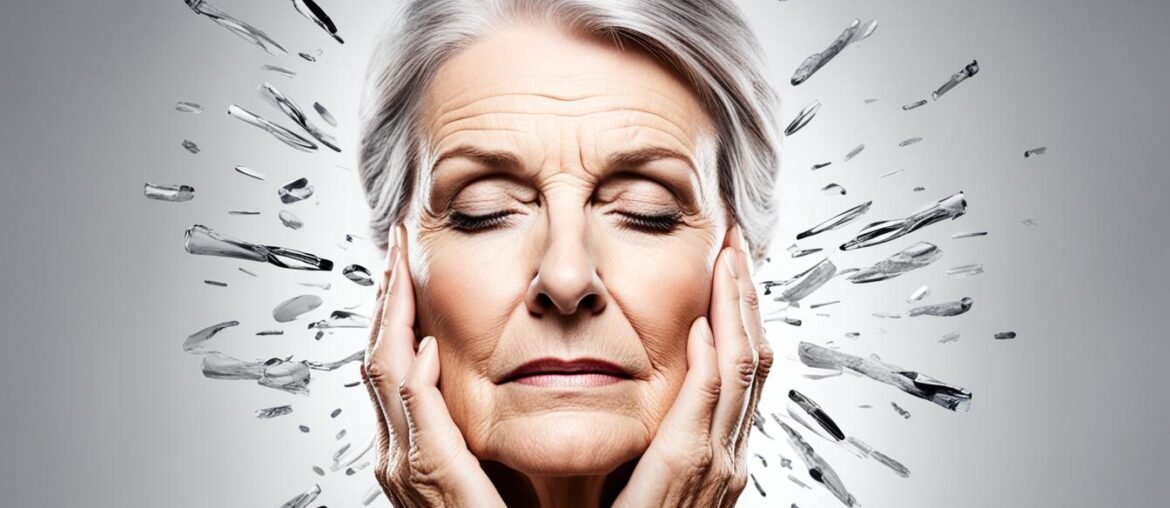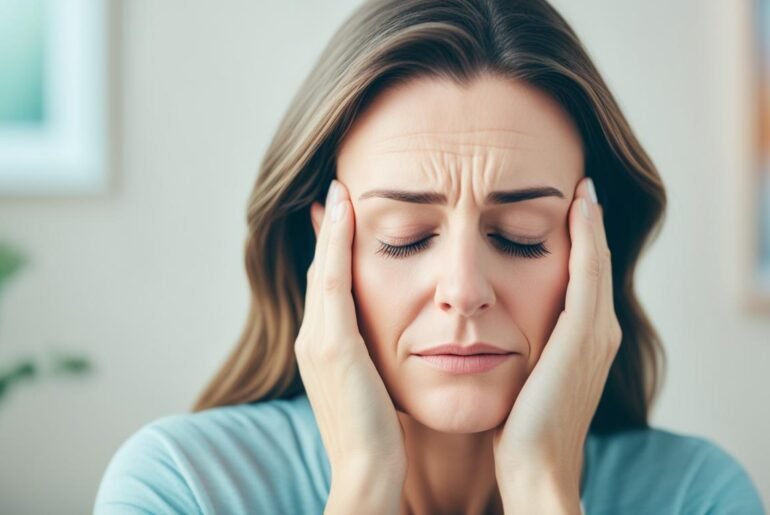Did you know that stress can accelerate the aging process of your skin? It’s not just about genetics or skincare routines. Chronic stress can have a profound impact on your skin’s health and aging. Research studies have shown a strong correlation between stress and various skin conditions, such as acne, wrinkles, dry skin, and more. Understanding the connection between stress and skin aging is crucial for maintaining healthier and more youthful-looking skin.
Key Takeaways:
- Chronic stress can have negative effects on skin health and contribute to premature aging.
- Stress can worsen acne by stimulating oil production in the sebaceous glands.
- Stress-induced changes in skin proteins can lead to a loss of elasticity and the formation of wrinkles.
- Stress can impair the function of the skin’s protective barrier, resulting in reduced hydration and weakened skin.
- Stress can weaken the immune system, leading to skin inflammation and the development or aggravation of conditions like psoriasis and eczema.
How Stress Affects Acne
When you feel stressed, your body releases the hormone cortisol, which can stimulate oil production in the sebaceous glands. Increased oil production can lead to clogged pores and the development of acne.
Several studies have found a positive correlation between stress levels and the severity of acne in individuals. Managing stress can help reduce the impact of stress-induced acne.
The Role of Cortisol
Cortisol, also known as the stress hormone, is released by the adrenal glands in response to stress. It plays a crucial role in the body’s fight-or-flight response. However, chronic stress can lead to consistently elevated cortisol levels, which can have negative effects on the skin.
One of cortisol’s effects is stimulating the sebaceous glands to produce more oil. This excess oil, combined with dead skin cells and bacteria, can clog the pores and lead to the formation of acne. Additionally, cortisol can increase inflammation in the body, further exacerbating acne symptoms.
The Impact on Acne Severity
Research has shown that individuals experiencing high levels of stress tend to have more severe cases of acne. The increased oil production and inflammation caused by stress contribute to the development and persistence of acne lesions.
Furthermore, stress can worsen existing acne by prolonging the healing process and making the skin more susceptible to further breakouts. This is because stress-induced hormonal imbalances can disrupt the skin’s natural healing mechanisms and compromise its ability to regulate oil production.
Managing Stress for Clearer Skin
Reducing stress levels and managing stress effectively can help minimize the impact of stress-induced acne. Here are some strategies that may be beneficial:
- Practice stress-reducing activities: Incorporate relaxation techniques such as deep breathing exercises, mindfulness meditation, and yoga into your daily routine.
- Maintain a healthy lifestyle: Regular exercise, a balanced diet, and sufficient sleep can help regulate stress levels and promote overall well-being.
- Seek support: Reach out to friends, family, or a counselor for emotional support and guidance in managing stress.
By adopting stress management techniques and implementing healthy lifestyle habits, you can take proactive steps towards clearer, healthier skin.
| Severity of Acne | Stress Level |
|---|---|
| Minimal | Low |
| Moderate | Moderate |
| Severe | High |
Effects of Stress on Skin Elasticity and Wrinkles

Chronic stress can have a significant impact on the elasticity of your skin, leading to the formation of wrinkles and other signs of premature aging. This is due to stress-induced changes in the proteins that maintain the elasticity of your skin.
One common stress response is the repeated furrowing of the brow. When we’re stressed, we often find ourselves furrowing our brows as a physical manifestation of our worry or anxiety. Unfortunately, this repeated movement can contribute to the development of wrinkles over time.
Research has shown that stress-induced protein changes can accelerate the aging process and reduce the elasticity of the skin. These changes can result in a loss of firmness and suppleness, making wrinkles more visible and prominent.
It’s important to recognize the impact that stress can have on your skin and take steps to manage stress levels effectively. By reducing stress and finding healthy coping mechanisms, you can help maintain the elasticity of your skin and minimize the formation of wrinkles.
Stress-Induced Protein Changes and Skin Elasticity
When you experience stress, your body releases hormones that can affect the production of proteins in your skin. High levels of stress hormones like cortisol can disrupt the synthesis and arrangement of collagen and elastin, which play crucial roles in maintaining the structural integrity and elasticity of your skin.
Collagen is a protein that provides support and strength to your skin, while elastin allows your skin to stretch and bounce back. When stress hormones interfere with the production and organization of these proteins, your skin becomes less resilient and more prone to sagging, resulting in the formation of wrinkles.
In addition to the physiological changes caused by stress hormones, the repeated furrowing of the brow can also contribute to the development of wrinkles. The repeated muscle contractions and movements can permanently etch lines on the forehead and between the eyebrows, leading to the appearance of deep-set wrinkles.
The effects of stress on the skin are not limited to the surface. Chronic stress triggers a cascade of changes within the body that can have far-reaching consequences for overall skin health and the visible signs of aging.
Minimizing the Effects of Stress on Skin Elasticity
To maintain the elasticity of your skin and minimize the formation of wrinkles caused by stress, it’s essential to adopt a holistic approach that addresses both the physical and emotional aspects of stress management.
Here are some strategies you can incorporate into your daily routine:
- Practice stress-relieving activities: Engage in activities that help reduce stress levels, such as meditation, yoga, deep breathing exercises, or spending time in nature.
- Adopt a healthy lifestyle: Eat a balanced diet, get regular exercise, and prioritize quality sleep to support overall skin health.
- Seek emotional support: Talk to friends, family, or a mental health professional to help manage stress and develop healthy coping mechanisms.
- Take care of your skin: Use skincare products that promote collagen production and skin elasticity, such as those containing retinol or hyaluronic acid.
Remember, managing stress is a lifelong journey, and finding what works best for you may take time. By prioritizing stress management and adopting healthy habits, you can help maintain the elasticity of your skin and keep wrinkles at bay.
Impact of Stress on Skin Barrier Function
The stratum corneum, the outer layer of the skin, plays a crucial role in maintaining skin hydration and acting as a protective barrier. It consists of dead skin cells held together by lipids, creating a barrier that prevents the entry of harmful substances and maintains skin water retention.
However, chronic stress can have detrimental effects on the stratum corneum and its function. Studies have shown that stress can impair the skin barrier, leading to reduced skin hydration and weakened protective function. This can result in increased skin sensitivity, dryness, and a higher risk of skin conditions such as eczema and dermatitis.
One study found that interview stress specifically can slow down the healing process of the skin barrier, affecting its ability to retain water. This can further worsen skin dryness and compromise the overall health and appearance of the skin.
Proper skin hydration is essential for maintaining a healthy complexion. When the skin barrier is compromised due to stress, it becomes more prone to moisture loss, resulting in dry and dehydrated skin. This can contribute to the development of fine lines, wrinkles, and a dull complexion.
Chronic stress can impair the function of the stratum corneum and compromise the skin’s barrier, leading to reduced skin hydration and increased vulnerability to skin conditions.
It’s important to note that the effects of stress on the skin barrier function can vary from person to person. Some individuals may be more susceptible to stress-induced skin barrier dysfunction, while others may have a more resilient skin barrier. Nevertheless, managing stress and adopting a skincare routine that focuses on restoring and strengthening the skin barrier can help mitigate these effects.
Ways to Improve Skin Barrier Function and Hydration
- Use gentle cleansers and avoid harsh products that can strip the skin of its natural oils.
- Moisturize regularly to replenish lost moisture and restore the skin barrier.
- Avoid prolonged exposure to hot water and opt for lukewarm showers or baths instead.
- Protect your skin from the sun by applying sunscreen, wearing protective clothing, and seeking shade.
- Include hydrating ingredients in your skincare routine, such as hyaluronic acid and ceramides.
- Practice stress management techniques, such as meditation, deep breathing exercises, and engaging in activities that promote relaxation.
Taking these steps to improve skin barrier function and hydration can help counteract the negative effects of stress on the skin and promote a healthier, more resilient complexion.
Effects of Stress on Skin Barrier Function
| Effects of Stress | Impact on Skin Barrier Function |
|---|---|
| Impaired healing process | Slows down the skin barrier’s ability to retain water |
| Reduced skin hydration | Causes dryness and increases the risk of skin conditions |
| Weakened protective function | Increases vulnerability to harmful substances and environmental factors |
| Higher risk of moisture loss | Contributes to skin dryness, fine lines, and wrinkles |
Understanding the impact of stress on skin barrier function is crucial for maintaining healthy and resilient skin. By implementing stress management techniques and adopting a consistent skincare routine that focuses on restoring and strengthening the skin’s protective barrier, individuals can mitigate the negative effects of stress and promote optimal skin hydration and health.
Influence of Stress on Skin Inflammation and Rashes

Stress can have a profound impact on the health of our skin, leading to inflammation and the development or aggravation of various skin conditions. When we are under stress, our immune system can become imbalanced, which affects the bacteria on our skin. This imbalance, known as dysbiosis, can disrupt the natural microbiome on our skin and contribute to skin inflammation.
One of the skin conditions that can be triggered or worsened by stress-induced inflammation is psoriasis. Psoriasis is a chronic autoimmune condition characterized by red, scaly patches on the skin. Stress can exacerbate the symptoms of psoriasis, leading to flare-ups and increased discomfort.
Additionally, eczema, a condition characterized by dry, itchy, and inflamed skin, can also be influenced by stress. Stress can weaken the skin’s barrier function, making it more susceptible to moisture loss, irritants, and allergens. This can trigger or intensify eczema symptoms, causing redness, itching, and the formation of rashes.
Contact dermatitis, another common skin condition, can also be affected by stress. Stress-induced inflammation can increase the skin’s sensitivity to certain substances, such as perfumes, soaps, or allergens, leading to contact dermatitis. This condition presents as redness, itching, and the development of a rash in the area of contact with the irritant.
To better understand the impact of stress on our skin, it is crucial to recognize the connection between stress-induced immunity imbalance and skin inflammation. By managing our stress levels and implementing effective stress-reducing techniques, we can help restore balance to our immune system and minimize the risk of dysbiosis and skin inflammation.
Key Takeaways:
- Stress can lead to skin inflammation and exacerbate conditions such as psoriasis, eczema, and contact dermatitis.
- Chronic stress can disrupt the balance of bacteria on the skin, known as dysbiosis.
- Psoriasis is an autoimmune condition that can be triggered or worsened by stress-induced inflammation.
- Eczema is a condition characterized by dry, itchy, and inflamed skin that can be influenced by stress.
- Contact dermatitis can occur or worsen due to stress-induced inflammation and increased skin sensitivity to irritants.
Skin Conditions Affected by Stress
| Skin Condition | Description |
|---|---|
| Psoriasis | Chronic autoimmune condition characterized by red, scaly patches on the skin |
| Eczema | Condition characterized by dry, itchy, and inflamed skin |
| Contact Dermatitis | Inflammation and rash caused by contact with irritants or allergens |
Stress and Eye Bags
Eye bags, characterized by swelling or puffiness beneath the eyelids, can be influenced by stress. Chronic stress can lead to sleep deprivation, which has been shown to increase signs of aging, including reduced skin elasticity and the development of under-eye bags.
When we experience stress, it can disrupt our sleep patterns, making it difficult to get a good night’s rest. Sleep deprivation not only affects our overall well-being but can also have visible effects on our skin, particularly in the delicate under-eye area.
Inadequate sleep can lead to a loss of skin elasticity, causing sagging and the formation of under-eye bags. It can also result in the accumulation of fluid and blood in the under-eye area, leading to puffiness and dark circles.
Research studies have found a correlation between chronic sleep deprivation, increased levels of the stress hormone cortisol, and the development of under-eye puffiness and bags. When we don’t get enough sleep, our body produces more cortisol, which can contribute to the breakdown of collagen and elastin, the proteins responsible for maintaining skin’s elasticity and firmness.
Additionally, sleep deprivation can impair the lymphatic drainage system, which is responsible for removing waste and excess fluid from the under-eye area. As a result, fluid can accumulate, leading to puffiness and the appearance of bags.
Managing stress and prioritizing good sleep hygiene can be effective strategies for reducing under-eye puffiness and bags. Implementing relaxation techniques, maintaining a consistent sleep schedule, and creating a conducive sleep environment can all contribute to better sleep quality and improved skin health.
Quick Tips to Reduce Under-Eye Puffiness:
- Ensure you are getting enough sleep each night
- Avoid excessive salt intake, as it can cause fluid retention
- Apply a cold compress or chilled cucumber slices to the under-eye area to help reduce swelling
- Use a hydrating eye cream or gel containing ingredients like hyaluronic acid or caffeine to minimize puffiness
By addressing stress and prioritizing sleep, you can help reduce the appearance of under-eye puffiness and bags, promoting a more youthful and refreshed appearance.
Stress and Gray Hair/Hair Loss

Stress has long been linked to various health concerns, but did you know it can also contribute to the premature graying of hair? Recent studies have shed light on the connection between stress and the appearance of gray hair. One key factor is the stress-induced disappearance of melanocyte stem cells, which are responsible for producing hair pigments. When these stem cells are depleted, it can lead to the development of gray hair.
Additionally, chronic stress can disrupt the normal hair growth cycle, resulting in a condition known as telogen effluvium. Telogen effluvium is characterized by excessive hair shedding and can further contribute to hair loss. This disruption can be distressing for individuals experiencing the effects of stress-induced hair thinning and baldness.
Managing stress is crucial for maintaining not only your overall well-being but also the health of your hair. By implementing stress reduction techniques and adopting a healthy lifestyle, you can mitigate the impact of stress on your hair and potentially slow down the graying process.
| Factors Contributing to Stress-Induced Gray Hair | |
|---|---|
| Stress Factor | Effect on Hair |
| Disappearance of melanocyte stem cells | Leads to gray hair development |
| Telogen effluvium | Excessive hair shedding and potential hair loss |
It’s important to note that while stress can play a role in the graying of hair, it is not the sole factor. Genetics, age, and other lifestyle choices may also contribute to the appearance of gray hair. However, by effectively managing stress and adopting healthy habits, you can support the overall health of your hair and potentially delay the graying process.
Other Ways Stress Affects the Face

Stress can take a toll on our face in various ways, leading to undesirable effects that can impact our overall well-being. Let’s explore some of the ways stress can manifest on the face:
Teeth Grinding and Temporomandibular Joint Dysfunction
One common manifestation of stress is teeth grinding, medically known as bruxism. Under stress, many individuals unknowingly clench or grind their teeth, especially during sleep. This can result in tooth damage, jaw pain, headaches, and even temporomandibular joint dysfunction (TMJ). TMJ causes discomfort and limitations in jaw movement, affecting daily activities like eating and speaking.
Face Flushing
When we experience stress, changes in our breathing patterns can occur, causing face flushing. This means that the blood vessels in our face dilate, leading to a temporary reddening or warmth in the facial skin. It’s important to note that face flushing due to stress is a temporary phenomenon and usually subsides once the stressor has been addressed.
Sore Lips from Chewing or Biting
Stress can sometimes lead to nervous habits like chewing or biting on our lips. This constant pressure and friction can result in soreness, dryness, and even small cuts on the lips. It’s essential to be mindful of these behaviors and try to find healthier ways to manage stress to prevent further discomfort.
| Effects of Stress on the Face | Examples |
|---|---|
| Teeth Grinding | Tooth damage, jaw pain, TMJ |
| Face Flushing | Temporary redness, warmth in the face |
| Sore Lips | Dryness, discomfort, small cuts on the lips |
Managing stress not only benefits our mental and emotional well-being but also plays a crucial role in maintaining overall skin health. By adopting stress-reduction techniques, such as meditation, exercise, and seeking support from loved ones, we can minimize the impact of stress on our face and improve our overall quality of life.
Coping with Stress for Better Skin Health

Effectively managing stress is essential for maintaining optimal skin health. By developing healthy coping mechanisms and incorporating specific lifestyle habits, you can reduce the negative effects of stress on your skin.
Stress Management
Implementing stress management techniques can significantly impact your overall well-being, including your skin health. Consider incorporating relaxation activities such as meditation, deep breathing exercises, or yoga into your daily routine. These activities help promote relaxation, reduce anxiety, and lower stress levels.
Lifestyle Habits
Adopting healthy lifestyle habits is crucial for managing stress and promoting healthy skin. Prioritize a well-balanced diet rich in antioxidants, vitamins, and minerals to support your skin’s overall health. Additionally, ensure you are getting enough quality sleep as sleep deprivation can exacerbate the negative effects of stress on the skin.
Physical Exercise
Regular physical exercise is not only beneficial for your physical health but also plays a significant role in stress management. Engaging in exercise releases endorphins, which are known as “feel-good” hormones that help reduce stress and promote a sense of well-being. Aim for at least 150 minutes of moderate-intensity exercise per week.
Seeking Support
Don’t hesitate to seek support from friends, family, or professionals when dealing with stress. Talking about your concerns and emotions with others can provide valuable perspective, advice, and emotional support. Consider reaching out to a therapist or joining a support group to further enhance your stress management strategies.
Avoiding Drugs and Alcohol
While it may be tempting to turn to drugs or alcohol as a form of temporary relief, they can actually exacerbate stress and have detrimental effects on your skin. Instead, seek healthier alternatives to cope with stress, such as engaging in hobbies, practicing mindfulness, or spending time in nature.
Remember, effectively managing stress requires a multi-faceted approach that combines relaxation activities, healthy habits, exercise, and support systems. By prioritizing stress management, you can enhance your overall well-being and maintain healthier skin.
Take a proactive step today to manage stress and improve your skin health!
Conclusion
In conclusion, the connection between stress and skin aging is evident, highlighting the importance of managing stress for skin health. Chronic stress can have detrimental effects on the skin, leading to premature aging and various skin conditions. However, by understanding this connection and implementing effective stress management strategies, individuals can minimize the impact of stress on their skin.
Taking proactive steps to manage stress, such as engaging in relaxation activities, maintaining a healthy lifestyle, and seeking support, can significantly improve skin health and overall well-being. By reducing stress levels, individuals can mitigate the risk of developing skin conditions like acne, wrinkles, dry skin, and inflammation.
It is crucial to prioritize self-care and make stress management a part of our daily routine. Incorporating regular exercise, maintaining a balanced diet, getting enough sleep, and avoiding drugs and alcohol are essential steps in managing stress for healthier skin. Ultimately, by taking control of stress, we can improve our skin’s health, slow down the process of aging, and promote a more youthful appearance.
FAQ
What is the connection between stress and skin aging?
Research has shown that chronic stress can have serious consequences on skin health, including premature aging. Stress can impact the skin in various ways, such as causing acne, wrinkles, dry skin, and more.
How does stress affect acne?
When you experience stress, your body releases the hormone cortisol, which can stimulate oil production in the sebaceous glands. Increased oil production can lead to clogged pores and the development of acne. Several studies have found a positive correlation between stress levels and the severity of acne.
How does stress affect skin elasticity and wrinkles?
Chronic stress can lead to changes in the proteins in your skin, resulting in a loss of elasticity. The repeated furrowing of the brow, a common stress response, can also contribute to the formation of wrinkles. Research has shown that stress-induced changes in skin proteins and elasticity can accelerate the aging process and the development of wrinkles.
What is the impact of stress on skin barrier function?
The stratum corneum, the outer layer of the skin, plays a crucial role in maintaining skin hydration and acting as a protective barrier. Chronic stress can impair the function of the stratum corneum, resulting in reduced skin hydration and weakened barrier function. Research has shown that stress can slow down the healing process of the skin barrier, affecting its ability to retain water.
How does stress affect skin inflammation and rashes?
Stress can weaken the immune system, leading to an imbalance of bacteria on the skin known as dysbiosis. This imbalance can result in skin inflammation and the development or aggravation of conditions such as psoriasis, eczema, and contact dermatitis.
Does stress contribute to the development of eye bags?
Yes, chronic stress can lead to sleep deprivation, which has been shown to increase signs of aging, including reduced skin elasticity and the development of under-eye bags.
Can stress cause gray hair or hair loss?
Recent studies have shown that stress can cause the disappearance of melanocyte stem cells responsible for hair color, leading to the development of gray hair. Chronic stress can also disrupt the hair growth cycle, leading to a condition called telogen effluvium, characterized by excessive hair shedding.
How can stress affect other aspects of the face?
Stress can manifest in various ways on the face, such as teeth grinding, which can lead to tooth damage and temporomandibular joint dysfunction. Stress can also cause face flushing due to changes in breathing patterns and result in sore lips from chewing or biting under stress.
How can I cope with stress for better skin health?
Effectively managing stress can have a positive impact on skin health. Developing healthy coping mechanisms, such as engaging in relaxation activities, maintaining good lifestyle habits (healthy diet and sleep), staying physically active, seeking support from others, and avoiding drugs/alcohol, can help reduce the effects of stress on the skin.
What is the conclusion regarding stress and skin aging?
Chronic stress can have detrimental effects on skin health and contribute to premature aging. Understanding the connection between stress and various skin conditions empowers individuals to take proactive steps in managing stress to maintain healthier skin. By implementing stress management strategies and seeking support, individuals can minimize the impact of stress on their skin and overall well-being.




